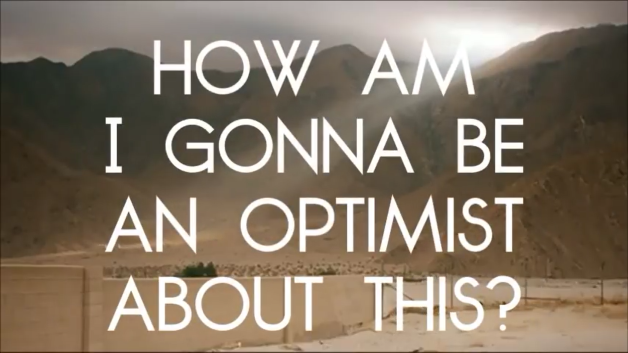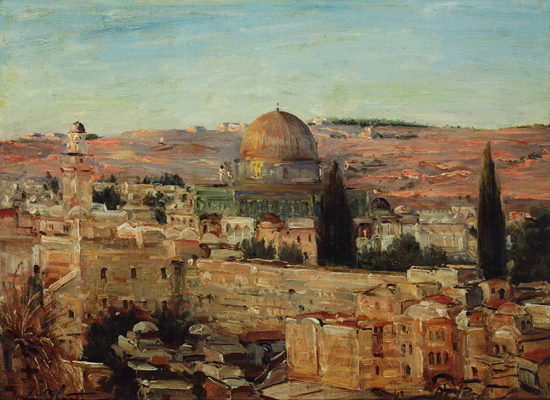Traditionally, the labyrinth is an uncluttered opportunity for centering prayer. It usually consists of a single path that leads into the center and back out. There are twists and turns, switchbacks, and apparent setbacks that actually take you further along the path to your goal, but feel like moving in the wrong direction. Unlike in a maze – the labyrinth’s choose-your-own-adventure cousin – if you simply walk the path in front of you, you will get where you’re going. Labyrinths are often found outdoors or in relatively bare chapels with an altar and candles that welcome people to come and unburden themselves of whatever they’re carrying, yoke themselves to Christ, and practice walking in the spirit. It is a lovely form of sacred space: simple yet suggestive. The idea presented below is not intended as an improvement over a traditional labyrinth. We borrowed the labyrinth motif because it brought to life the sense of realization while in movement, the walking epiphanies of the story of the disciples meeting Jesus on the road to Emmaus. As such, it would be appropriate to set up during Epiphany or during Lent – when we wander the desert not to lose ourselves, but to find our center – as well as when we did it: during the season of Easter, before Ascension, when this story originally took place.

A labyrinth of the everyday – trompe l’oeil outside Chartres Cathedral
Road to Emmaus Labyrinth
Luke 24:13-35
Our[1] labyrinth consisted of a huge drop cloth on the floor marked in a variation on a classic labyrinth pattern.[2] With staggered starts, the labyrinth could accommodate four or five people at a time. We set up eight compact, numbered stations along the path – five going in, one at the center, and two going out.[3] Two readers (one reading the script, the other the scripture passages throughout) recorded an audio tour with music as follows. People were given headphones and a cheap, one-button mp3 player and invited to pause and play and go at their own pace. In this script the numbers correspond to the track number.
- “Welcome”
Welcome to the Emmaus Road Labyrinth. Here we enter the story of two disciples meeting the resurrected Jesus as they walked along the road to a town called Emmaus. In a sense, we’ll be walking along with them as we progress into and back out from the heart of the labyrinth. A labyrinth is not a maze. A maze is a puzzle to be solved. A labyrinth is a path to be followed. Walking a labyrinth is a completely different exercise than running a maze. Here there is no fear of being lost. The labyrinth externally enacts the internal experience of centering. Spiritually, it represents space set apart, or sacred space, in which we are drawn into the center, to the recognition of the presence of God, then return to the world blessed and changed by the experience, and better equipped to be an agent of blessing and change.
Each station in the labyrinth has one track on this audio guide. Go at your own pace. This is a time to walk in the Spirit, swap stories with Jesus and listen for the voice of God in your life. If the words or music become a distraction, feel free to pause, skip ahead or ignore the recording entirely. Enter the labyrinth and continue walking until you reach station one.
- “Station One (going in): They were kept from recognizing him” Luke 24:13-16
Jesus’ followers then and now have different perceptions of who he is and what he came to do. The disciples’ false perceptions of Jesus kept them from knowing and loving him for who he is. They thought he was a teacher, a revolutionary, a ruler; they thought he was dead.
It is difficult to recognize the presence of God when God doesn’t act according to our assumptions. St. John of the Cross called this the dark night of the soul. He saw it as a time in which, despite all appearances and perceptions, even though it feels like stumbling around in the dark, the soul grows in faith and intimacy with Christ Himself, rather than with illusions of Him.
Open the flaps to see images of the Jesus we think we know. Ask him to reveal himself so that we may love him as he truly is.[4]
Music: “The Dark Night of the Soul” by Loreena McKennitt
- “Station Two (going in): Downcast” Luke 24:17
The Seder is the traditional meal and central celebration of Passover. To read about the origins of Passover, please pause this recording and read Exodus 11 & 12 marked in the bibles here. The entire extended family is to come together. Throughout the meal, they retell the Exodus story in the first person as if they had been one of the slaves freed from Pharaoh’s bondage. The bitter herbs, horseradish here, are eaten to remind the participants of the bitterness of slavery. Are you downcast? Where are you experiencing bitterness? Taste the herbs and let the words of Psalm 22 be your cry to heaven.
- “Station Three (going in): Storytelling, Part 1” Luke 24:18-24
The disciples on the road were consoling each other by telling stories and remembering Christ. On index cards, write about a time in your life when you met with God. Pin them to the storyboard. Read others’ stories and allow others to read your story.
- “Station Four (going in): Storytelling, Part 2” Luke 24:25-27
Now Jesus tells his story, explaining his work throughout the ages, establishing and re-establishing relationships with his people. Flip through a bible and take some time to hear God’s story of constant provision and love. The lectionary bookmarks and bibles are free for you to take with you.
Music: “Jesus’ Blood Never Failed Me Yet” by Jars of Clay (light) or Gavin Bryars (strong)
- “Station Five (going in): Welcoming the Stranger” Luke 24:28-29
The disciples welcomed Jesus though they did not yet recognize him. Who is the stranger walking along the road with you now? Have you ever encountered Christ in or through a stranger? Have you ever been that stranger? Consider these questions as you watch the video.[5] Pause this program and use the headphones attached to the monitor.
- “Station Six (center): Breaking Bread” Luke 24:30-31
Here in the center of the labyrinth, Jesus meets us and offers sustenance for the journey outward. Break bread with Christ. Join in this prayer from “Six Recognitions of the Lord” by Mary Oliver as you take and eat.
Oh, feed me this day, Holy Spirit, with
the fragrance of the fields and the
freshness of the oceans which you have
made, and help me to hear and to hold
in all dearness those exacting and wonderful
words of our Lord Christ Jesus, saying:
Follow me.
[minute pause]
When you are ready to begin your journey back out into the world, take a card and exit out the corner opposite from the one you entered. Practice walking prayerfully.
- “Station Seven (going out): Burning Hearts” Luke 24:32
What is Christ saying to you on the road? What does scripture say about Jesus? What does it say about you? Have you looked recently to see? Light a candle and pray for the scriptures to be opened to you, for the words to burn within your heart.
[pause]
What words from the scripture cards or from your bible reading do you want burned deeper into your heart? Write them onto a paper heart, tack it to a candle and take it with you. Light it at home, while it burns pray that the scriptures will be opened to you and your heart opened to them.
Music: “Listen” by Michelle Tumes
- “Station Eight (going out): Returning to Jerusalem” Luke 24:33-35
Where is your “Jerusalem?” Where will you now return and share what you have experienced? Who can you talk to about what you are learning about Jesus?
Christ is risen! Take a cross to give to a friend as a reminder of Christ the Lord, alive and walking with us.
[1] You know you have a successful collaboration going when no one can remember whose ideas were whose and they’ve become too interwoven to attribute them separately anyway. I got to write the script, but the experience as a whole was thought through and produced by everyone in our alt worship planning group: Cristie Kearny, Deb Hedeen, Judy Naegeli, Trisha Gilmore, Cathy Stevens, Heidi Estey, Kirk Heynen, James Kearny and Anika Smith.
[2] Ours happened to have one path leading in to the center and a different path leading back out, but generally I would recommend the Half-Chartres (basically the inside half of the design at Chartres Cathedral). You can find instructions for making a 12’ x 12’ version at “Karen’s Small Labyrinths” http://www.angelfire.com/my/zelime/labyrinthssmall.html#halfchartres. The size shown there would be sufficient for people to use one or two at a time with a single station in the middle, but wouldn’t accommodate what I’m describing here. Ours was about 4 times that size, maybe 25’ x 25’.
[3] The stations should be clearly numbered with the station number and the track number and labeled “going in” or “going out” so as not to confuse anyone. Remember they are all actually set up on and around a flat, open surface, so they will not be laid down linearly. If you use a single path labyrinth, people will be walking by stations 7 and 8 on the way in, but should only stop at them on the way out. We set up stations on small, low tables and music stands so they wouldn’t pose as obstacles by taking up too much space. Café tables would work nicely for the stations you can place around the outside of the circuit. Ideally, if someone’s standing at a station, another person should be able to pass them without stepping completely off the path.
[4] Our artists made this interactive piece. You can create your own by making a collage poster of images of Jesus or roles people think of Jesus playing: the miracle worker, the rustic shepherd, the white-suited televangelist, the revolutionary in a beret, the pacifist at a sit-in, etc. Then overlay the poster with another piece of poster board and cut flaps in it that open onto the various images.
[5] We commissioned a videographer and a high school student in our congregation to collaborate on a video of different kinds of people. You could make your own using stills of people in your church and neighborhood or footage from mission trips. Or you could download something along the lines of The Work of the People’s “Stranger” (http://www.theworkofthepeople.com/index.php?ct=store.details&pid=V00520) or LifesongMD’s “World Faces” (http://youtu.be/z6RLHKRs9D8).








